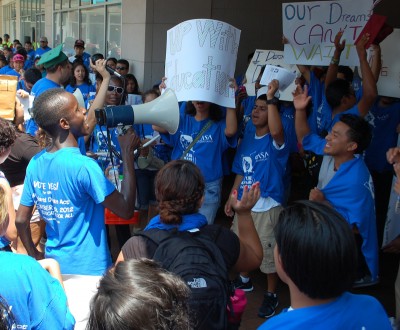As millions of Americans head to the polls Tuesday, most of the attention will be on the tight presidential race. But there are a number of ballot initiatives across the country that could significantly impact state education systems. Here’s a look at how voters could change policies on school choice, merit pay and more. Check back with The Hechinger Report after Election Day to find out the results.

Maryland voters will decide whether to uphold a law allowing undocumented immigrants to receive in-state tuition to public universities. (Photo by Edward Kimmel)
Florida: A ballot initiative in Florida, if passed, will remove language from the state’s constitution that bans religious institutions from receiving taxpayer money. The measure does not explicitly reference education, but if it is successful, it will likely pave the way for private-school vouchers. While Florida currently has a voucher program for special education students and a tax credit scholarship program for low-income students, its statewide voucher program was ruled unconstitutional in 2006 because it gave taxpayer money to religious schools. If this language is removed, it seems likely vouchers could be reinstated.
Georgia: If Georgia voters approve a new constitutional amendment, the state will set up a special commission to authorize new charters. Such a commission existed until 2011, when the State Supreme Court ruled it unconstitutional. Now, local school boards must first approve charter school applications. If the State Board of Education follows suit, the school can open. If the local school board rejects the application, would-be charter operators can still appeal to the state. The Georgia Board of Education can approve the charter, but it will only receive state and federal money – not local property-tax funds.
If the amendment passes, the state commission would be able to grant charters, regardless of local board support. Opponents say the change will take money and control away from local school systems. Proponents argue it will increase school choice across the state.
Idaho: A slate of controversial education laws could be overturned in Idaho on Election Day. The state’s teachers union is leading the charge against three recently passed laws through propositions on the ballot.
Proposition 1 aims to repeal a law mandating that 50 percent of teacher evaluations be tied to student growth – an increasingly common policy nationwide. The law also abolished teacher tenure, limited collective bargaining and eliminated incentives for early retirement. Proposition 2 would end Idaho’s new merit pay plan, which provides bonuses for teachers and administrators based on student growth on standardized tests. The law also allows for bonuses to be given to teachers who take hard-to-staff positions or leadership roles. And if a majority vote yes on Proposition 3, a law mandating that all students take two online classes before graduating high school will be repealed.
Maryland: Voters in Maryland will decide if undocumented immigrants will be eligible for in-state tuition at public universities. The Maryland legislature passed its own version of a federal bill that has yet to pass, the Development, Relief and Education for Minors (DREAM) Act, last year, which allowed undocumented immigrants who have attended high school in the state and first attend a community college to receive in-state tuition prices at Maryland colleges and universities. Opponents have argued the measure will encourage illegal immigration, but it looks likely the law will remain on the books. A Washington Post poll found 60 percent of voters supported it.
Washington: Washington is one of nine states that don’t allow charter schools. That could change if a ballot initiative passes that would allow the schools to open across the state. Such a measure has been rejected three times in the past. If the vote goes the other way this time, though, 40 charters may be authorized in the state over the next five years. A parent trigger provision is also written into the ballot. A majority of parents, or teachers, could vote to convert their traditional public school into a charter if the initiative passes.



